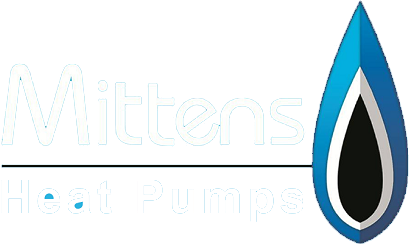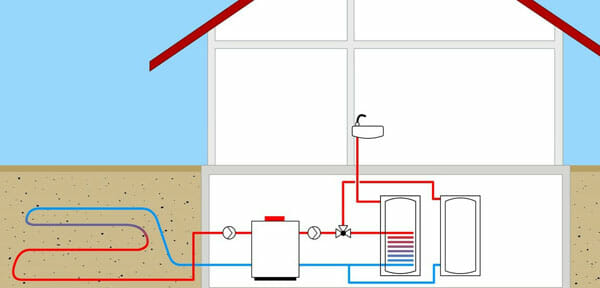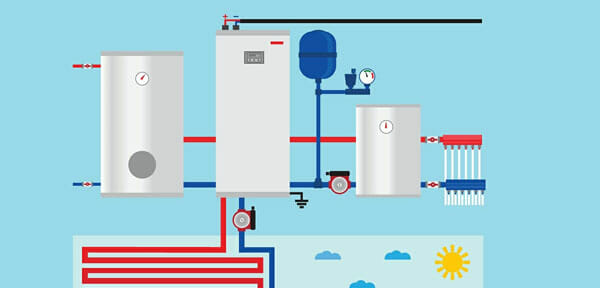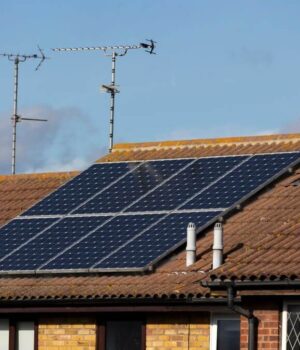

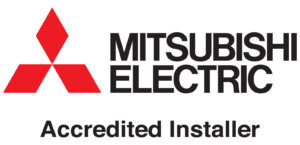


Why Choose Heat Pumps?
When you install heat pump functionality in your property you get about four times the amount of heat for every pound of electricity you use. Heat pumps can also be used as an air conditioner when the weather gets hot. With heat pump installed in your UK property, you can have all-year-round comfort.
Heat pumps are a green solution that doesn’t burn fossil fuels. Greenhouse gas emissions are practically zero. The nature of heat pumps means that you eliminate the production of carbon monoxide in your building.
How Do Heat Pumps Work?
Heat pumps are electric devices that extract and then move heat from one location to another. Heat pumps circulate a refrigerant to transfer the heat. Heat pumps transfer heat from colder places to warmer places, and warmer spots to the coldest areas and are extremely efficient. There are different types of heat source that can be used to power heat pumps.
The Lowdown on Heat Sources
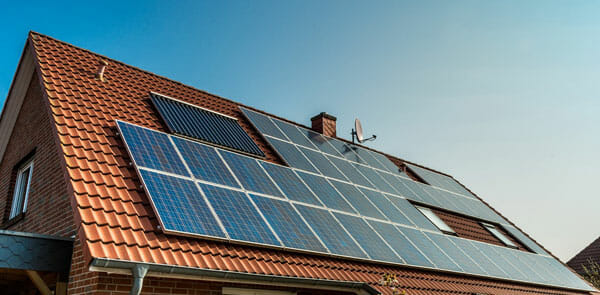
Solar Assisted Heat Pumps (SAHP)
Solar Assisted Heat Pumps (SAHP) use solar thermal technologies. Solar panels absorb heat from the sun and the heat pump does its work. Solar thermal systems are not as efficient as solar-assisted heat pumps, especially during the winter months.
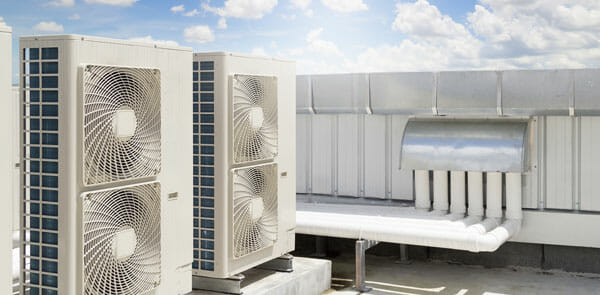
A Little More on Ground Source Heat Pumps
Ground Source Heat Pumps, also called geothermal heat pumps or GSHPs, utilise a pipe network that is laid under the ground. The heat that is taken from underground is transferred to a fluid and then circulated around a building for radiators and underfloor systems.
Get Your Heat Pump Questions Answered and Get a Quote
Get in touch with us through the form on this website or give us a call today and we will talk you through what you need. We will tailor heat pump quotes to your exact requirements and ensure that all regulations are met throughout the process. Getting a quote with The Mittens Heat Pumps UK is free, so get in touch to see how much money you save.
Advantages of Ground Source Heat Pumps
Compared to the heat generated directly electricity, the running costs of heat pumps are extremely low. Ground Source Heat Pumps also save money compared to gas boilers and oil boilers. Your savings will be dependent on the type of Ground Source Heat Pump you choose but can be anything up to a $.75 plus saving.
Biomass, LPG, burning oil and coal create carbon emissions either at the generating plant or in the home or commercial building. Heat pumps don’t generate carbon emissions and are entirely powered by a source of energy that is renewable.
There is no fuel storage with heat pumps. You don’t need to use an ignition, create harmful omissions or take up the space required for a furnace when you have a heat pump installed. Planning authorities are increasingly encouraging heat pumps due to their space-saving, quiet, safe and environmentally friendly properties. Heat pumps don’t require planning permission and, in the future, homes will not be able to be built with traditional energy sources and heat pumps will be the future.
The amount of energy savings will depend on your use and your existing system. Compared to a new gas boiler, you are likely to save at least 26% on your energy bills. This typically equates to around £500 to £1400 pounds per year in energy savings through the installation of a Ground Source Heat Pump.
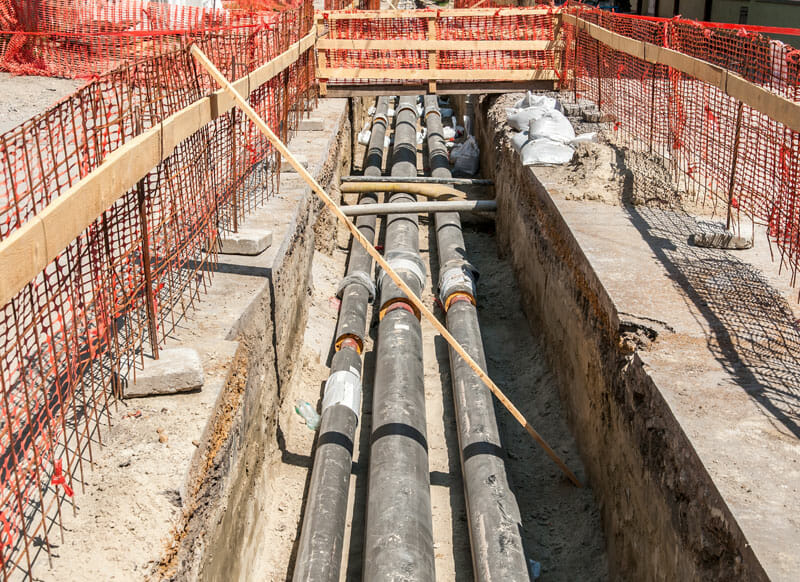
What Can Heat Pumps be Used with to Heat Your Property?
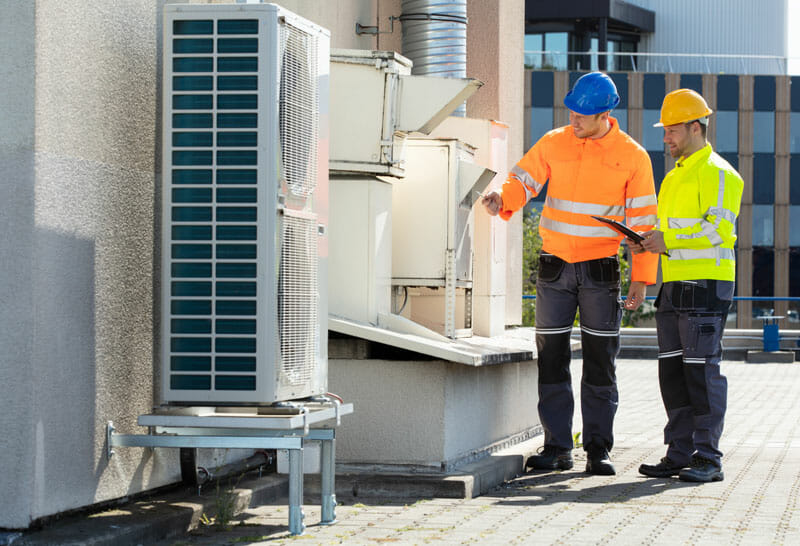
Heat pumps can work with heating and cooling systems via HVAC
Heating, ventilating and air conditioning systems (HVAC) work with heat pumps seamlessly to keep your building cold in the summer months and warm in the winter months. With heat pump HVAC system, you are guaranteed comfortable temperatures in your home all year round and you won’t have to rely on outside sources of energy and you would reduce your bills.
Underfloor heating and central heating
Heat pumps also work seamlessly with underfloor heating systems. You can control temperatures seamlessly with thermostats and control systems and heat pumps particularly work well with underfloor heating systems.
Heat Pump Brands Compared
| Brand | Output capacity | Physical Unit Size | Efficiency Ratings | Average running decibels | Unit Price |
|---|---|---|---|---|---|
| Amana | 52,000 BTU | 35.5 x 35.5 x 41.25 inches | Up to 21 SEER; ENERGY STAR efficient | 74 bB | £2,000 to £3,700 |
| Bryant | 24,000 to 60,000 | 43.81″H x 35″W x 35″D | Up to 20.5 SEER; ENERGY STAR qualified | 58 dB | £3,600 |
| Carrier | Heating: 25,200 to 37,200.Cooling: 32,800 to 35,200 BTU | 50.19 x 36.13 x 39.25 inches | Up to 20.5 SEER; ENERGY STAR partner | 55 dB | £4,000 |
| Coleman | 60,000 BTU | 46 1/2 x 34 1/2 x 38 1/4 inches | Up to 20 SEER; ENERGY STAR qualified | 54 dB | £1,200 |
| Goodman | Heating: 59,500 BTU/Cooling: 56,500 BTU | 35.5 x 35.5 x 40 inches | ENERGY STAR certified; up to 19 SEER | 75 dB | £3,200 |
| Lennox | 60,500 BTU | 47 x 39.5 x 35.5 inches | Up to 23.5 SEER;ENERGY STAR qualified | 64 to 74 dB | £4,400 |
| Rheem | 60,500 BTUs | 35.75 x 51 x 35.75 inches | Up to 20 SEER; ENERGY STAR qualified | 59 dB | Around £1,800 |
| Ruud | 60,500 BTUs | 51.17 x 36.13 x 36.13 inches | Up to 20 SEER and 11 HSPF; ENERGY STAR qualified | 59 dB | £2,500 to £5,600 |
| Trane | 60,000 BTUs | 54 x 37 x 34 inches | Rated Most Efficient 2019 by ENERGY STAR; Up to 20 SEER | 43 dB | £2,600 |
| York | 2 to 5 tons | 46 1/2 X 35 1/2 X 34 1/2 inches | Up to 20 SEER; ENERGY STAR qualified | 35 dB | £2,000 |
Here Are Some of the Heat Pump Brands That We Work With
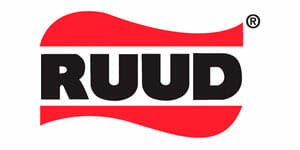













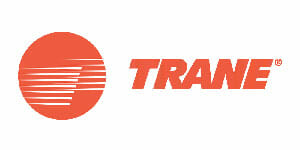

A little More on Air Source Heat Pumps
Here’s how Air Source Heat Pumps work
Air Source Heat Pumps take heat from the air outside and use that air to heat fluids that are circulated around a building. The fluids are compressed in order to raise the temperature, making it possible to heat hot water and generate heating from air temperature differentials.
Here’s how Air Source Heat Pumps work
Air Source Heat Pumps take heat from the air outside and use that air to heat fluids that are circulated around a building. The fluids are compressed in order to raise the temperature, making it possible to heat hot water and generate heating from air temperature differentials.

Comparing Air Source Heat Pumps and Ground Source Heat Pumps
It can be a difficult decision choosing between Ground Source and Air Source Heat Pump. It would tend to be more expensive to install Ground Source Heat Pump, but the energy efficiency gained can be greater.
Ground Source Heat Pumps essentially take their energy from water and underground sources that retain energy much better than air and therefore are much more efficient and can save more money.
Air Source Heat Pumps consume more energy due to the requirements of converting air temperatures to higher temperatures compared with the greater ground temperature differential of Ground Source Heat Pumps.
ASHPs, as mentioned, are less expensive upfront and will tend to provide a very good return on your investment. As air temperatures outside fall during colder months, Air Source Heat Pumps become less efficient.
Air Source Heat Pumps are very easy to install and can be as simple as putting up an air conditioner.
Due to their nature, Ground Source Heat Pumps need the excavation of land and so you need suitable subsoil and enough space for the process.
Air source heat pumps and Ground Source Heat Pumps are both energy-efficient but are very different types of installation.
Ground Source Heat Pumps will save you a lot on your energy bills but will be more expensive upfronts, and will be a more complex installation process. Air Source Heat Pumps have an easier installation process but won’t save you as much on your bills.
Get in touch today to find out more about heat pumps
We can offer you quotes on Ground Source Heat Pumps and Air Source Heat Pumps, and can also provide you with maintenance and repairs. Get in touch today by phone or by filling out our form on the websites. We are here to guide you through any requirement you have to do with commercial or domestic heat pumps.
How Do I Make Use of Renewal Renewable Heat Incentives?
The government provides incentives for domestic homeowners looking to install renewable heat technologies in their buildings like solar thermal and heat pumps.
The Renewable Heat Incentive scheme is administered Ofgem, the energy regulator. You can find application forms for renewable heat incentives on the Ofgem website, or we can help you with the process.
The kind of information that is required for an RHI application are a microgeneration certification scheme number, your energy performance certificate open key term number, and your bank details for Ofgem to get money to you.
You need to ensure that your bank account number name is the same as the name of your application. The Renewable Heat Incentive scheme come and go, but they always provide excellent cost savings on heat pumps as this technology is seen as the renewable energy source for the future.
Heat Pumps and District Heating and Communal Heating
District heating, also referred to as teleheating and heat networks distribute heat from centralised sources via insulated pipes in commercial or residential buildings.
District heating save space and can heat communal buildings efficiently from a single source.
Communal heating involves heat transfer to multiple dwellings. Communal heating is appropriate for both lots of flats and for clusters of buildings that utilise the same heat source.
Heat pumps have proven extremely popular with both district and communal heating as they save energy, and because the cost of installation can be split between multiple units of occupation.
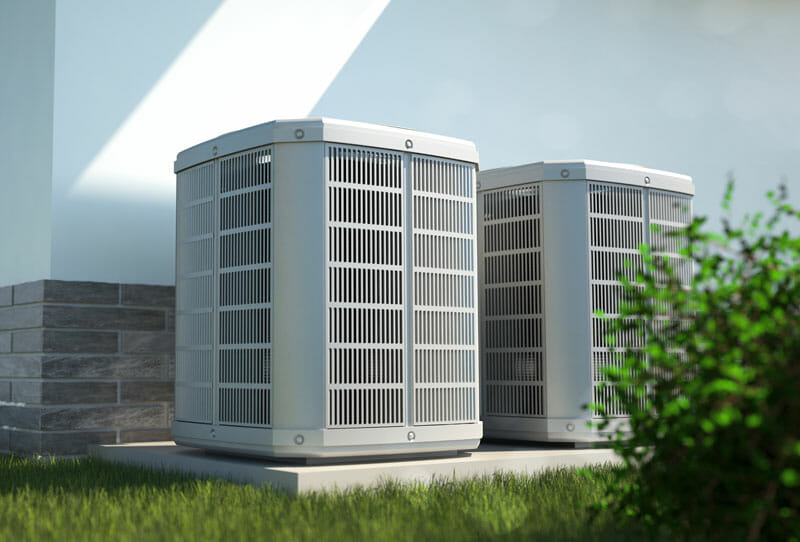
Fast and easy installation
Our heat pumps are designed to make installation as fast and easy as possible. Obviously, Ground Source Heat Pumps takes an excavation work and require more time and effort, but we will work around you to ensure that your daily routines are not disrupted.
Our installers are professional, respectful and friendly and will work hard to gets your heat pump installed with minimal fuss. Get in touch today to talk about Air Source Heat Pump or Ground Source Heat Pump installation.
How Big Do I Need the Heat Pump for my Property to Be?
There are two main factors that determine the size of the heat pump you require. The first is the square footage of your property. At the second is if big hallways and doorways exist in your property that links to the room you want to install the heat pump.
Heat pumps tend to be between 4 kW and 16 kW for typical homes. The bigger your home, the more heat output you require in order to ensure a comfortable environment.
Heat Pump Servicing and Maintenance
Heat pumps require some maintenance just as any other heating system would. Heat pump not properly maintained can run around 10 to 25% less sufficiently than a well-tuned heat pump. However, the maintenance required on heat pumps tends to be much less than with traditional gas boilers.
Our experts at The Mittens Heat Pumps UK can carry out inspections and maintenance on heat pumps, providing a fully qualified engineer to solve problems and ensure efficient maintenance. Our engineers can also ensure that systems are set up to meet your specific requirements and can do safety checks as well.
